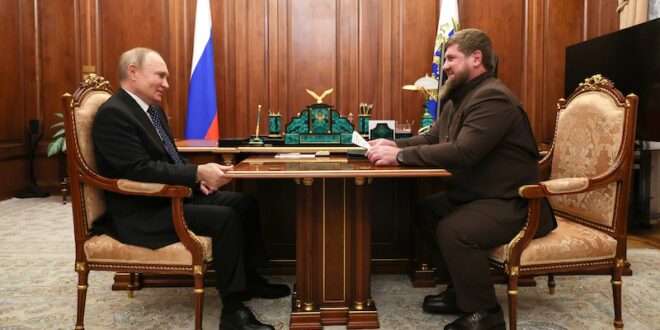Reading into Russian President Vladimir Putin’s actions in the aftermath of Yevgeny Prigozhin’s mutiny is comparable to entering a baffling alternate universe where messages are sent with symbols, cues and nonverbal communication (Medialeaks.ru; T.me/strelkovii, June 29).
Take, for example, the Russian president’s first post-coup visit, which left some observers scratching their heads—not only because of Putin’s well-known penchant for extreme social distancing and aversion to close-quarter interaction but also because there were other, arguably more important and pressing destinations he could have visited. Why would Putin pick Dagestan as a place to interact with crowds, ignoring, for instance, Rostov-on-Don, which hosts the Russian military headquarters for operations in Ukraine and had been captured by Prigozhin’s mercenaries? Why not Belgorod, which has been shelled on many occasions in the course of the war, or Voronezh, a city that the Wagner Group had taken control of during its march toward Moscow (BBC News Russian; Kommersant, June 24)?
The choice of Dagestan was far from random, and Putin, all the while, remained true to his roots as a security operative on a mission. To begin with, he knows the vast majority of Dagestanis are traditionally loyal and thus could expect enthusiastic citizens to show up, even without the goading of the general he appointed to run this impoverished and once conflicted corner of the country (T.me/kaspiysk_dagestan, June 28).
Moreover, the Kremlin leader may have been told that Dagestan, one of the largest Muslim-majority republics within Russia, was a perfect place to launch a rhetorical attack on the West (on aspiring North Atlantic Treaty Organization member Sweden, in particular), which, unlike the Kremlin, allows the desecration of the Quran. Putin knew his ostentatious display of deference to Islam’s holy book would go down well in the Muslim world, especially in Turkey, which appears to have been his chief objective. If that is indeed the case, Putin rightly calculated that Ankara would be angered by the Quran burning in Stockholm and remain opposed to Sweden’s NATO membership bid (Arab News; BNN Network, June 29; Daily Sabah, July 7)—though Turkish President Recep Tayyip Erdogan recently announced on July 10 that his country would now support Swedish membership (New Arab, July 11).
No doubt, the Russian leader was also aware that, shortly after his stunt in Dagestan, a panel of Moscow pundits would assemble to debate the visit on camera and praise his role as a wise statesman, respectful of all religions and a “unifying force” in the country (The Moscow Times, June 28; July 3). Putin, who has dominated Russia’s political scene for over two decades now, has become particularly crafty at staging such spectacles and playing to the crowds.
This time, he may have acted on advice from Chechen Republic head Ramzan Kadyrov, his most steadfast supporter, with whom Putin met in the Kremlin on June 27, a day before the visit to Dagestan (T.me/RKadyrov_95, June 28). Kadyrov, who has long staked out a position as a defender of Islam in Russia, wrote that “President Vladimir Vladimirovich Putin shows much respect to the Muslim population of our country” and sends “his best wishes to all Muslims, including the servicemen engaged in the military offensive in Ukraine.” It is not clear if the two discussed Prigozhin’s failed putsch, which, incidentally, Kadyrov condemned on June 24 only after Putin’s televised threats to crush the renegade oligarch’s forces. It is extremely likely, however, that the Russian president, who feels betrayed by Prigozhin, wanted to gauge Kadyrov’s loyalty and the level of support he can expect on the ground in the North Caucasus.
The Chechen leader, who sent his forces to both Rostov and Moscow to help Putin “preserve Russia’s unity and defend its statehood,” would have had no difficulty proving that the Kremlin leader’s worries were misplaced. However, it would not be much of a surprise if Putin took nothing for granted these days. After all, Kadyrov has a history of attacking the Russian military leadership for its failures in Ukraine even before Prigozhin decided to jump on the bandwagon (see EDM, September 21, 2022).
Kadyrov has recently refrained from criticism, probably sensing the Kremlin’s displeasure. He even clashed with Prigozhin over the latter’s “ambitions,” while his sidekicks dismissed the Wagner boss as a “blogger” and challenged him to a face-to-face confrontation to settle the growing feud (Kavkaz-uzel, June 26).
One positive outcome of Prigozhin’s aborted mutiny is that it laid bare the Putin regime’s vulnerabilities and exposed numerous cracks in its foundations. Although Putin’s grip on power remains strong—at least for now—he does increasingly look like the last Russian Tsar at the end of his reign. In fact, in his June 24 address, Putin himself drew parallels between the Wagner Group rebellion and the Russian Revolution, when a “blow like this was dealt to Russia in 1917, while the country was fighting in World War I” (Kremlin.ru, June 24).
At the moment, not a single institution in Russia is stronger than it was before the attempted mutiny. No leader, politician or general looks better today than they did before the putsch, except, perhaps, Kadyrov. The paradox of today’s Russia is that its leadership, watching the Wagner soldiers advance on Moscow facing little resistance, had to call in the Chechens to take them on. And although the Chechen forces never had a chance to engage the mutineers, it seems that, for now, the only person to emerge “victorious” from the two-day crisis is the Chechen leader.
However, this is hardly good news for Kadyrov, as it only heightens the fear and mistrust many Russians feel toward his private army. In the short term, the Kremlin will likely ignore, downplay or seek to allay those anxieties. At the same time, in the wake of the Wagner debacle, there may be a growing realization that co-opting Kadyrov’s forces to counter Prigozhin may, paradoxically, have undermined Moscow’s already tenuous hold over the Chechen leader, with potentially dangerous consequences in the long term.
 Eurasia Press & News
Eurasia Press & News

